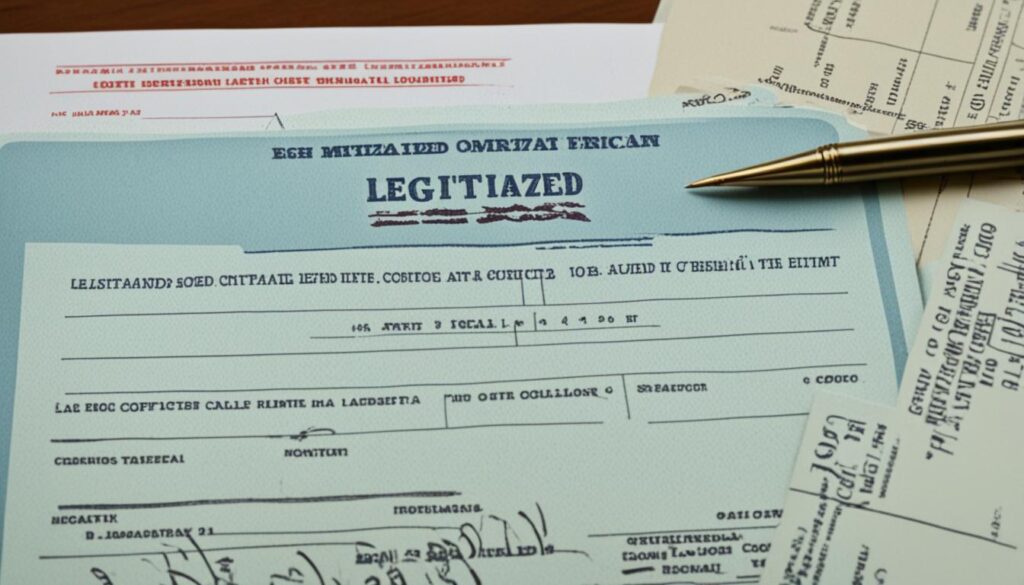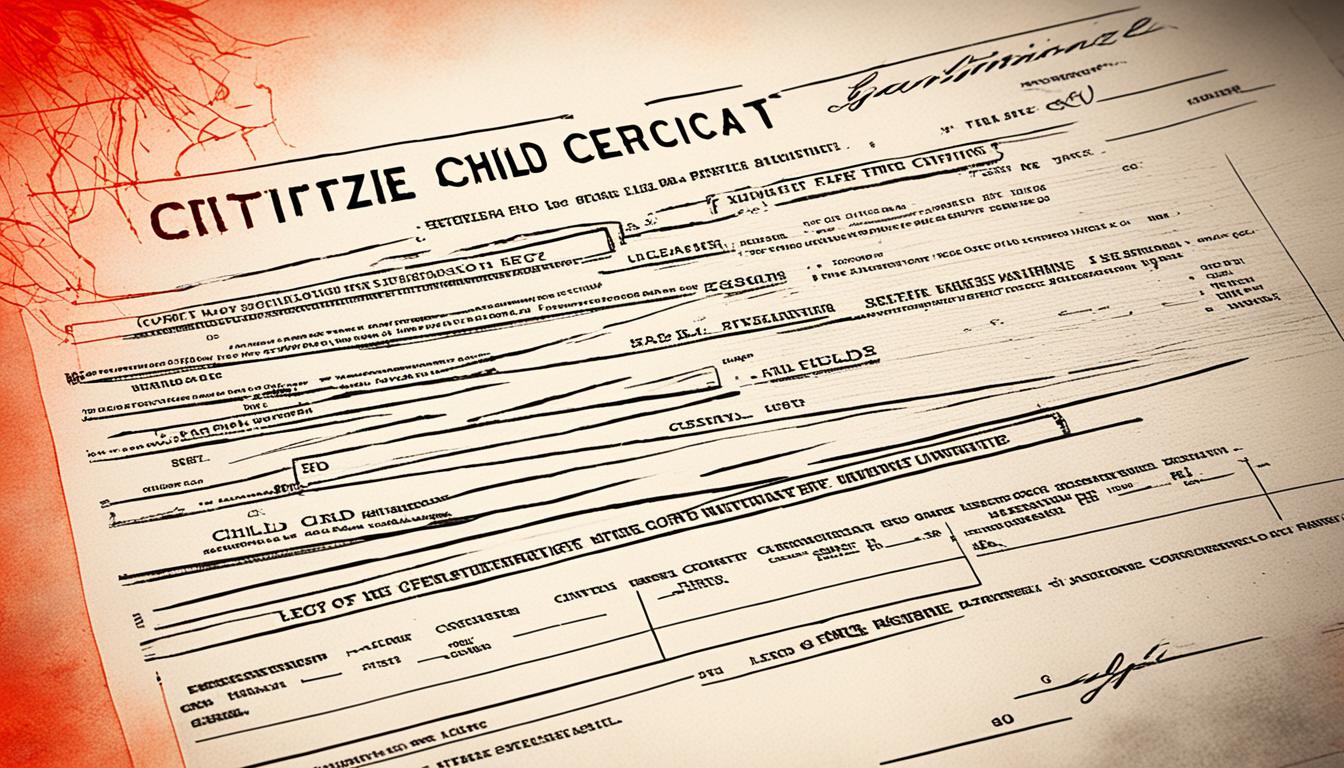As a new parent, you might think that signing your child’s birth certificate means you’re their legal guardian. But, this isn’t always true. The birth certificate is indeed a legal document. However, it doesn’t fully legitimize a child, especially for unmarried parents. The real deal on becoming a legal parent is a bit more complicated. It’s important to know the steps well to protect your and your child’s rights.
Key Takeaways
- Signing a birth certificate does not automatically establish legal parentage.
- Unmarried parents must take additional steps, such as signing a Voluntary Declaration of Parentage (VDOP), to legally establish paternity.
- Legal parentage grants parents rights and responsibilities, including child custody, visitation, and financial support.
- Failing to establish legal parentage can lead to difficulties in obtaining child support or making decisions about the child’s well-being.
- Same-sex couples and unmarried parents may face unique challenges in establishing legal parentage.
So, what makes a child ‘legitimate’ if not just signing their birth certificate? The key is in establishing legal parentage. In this article, we’ll dive deep into what it means and how to do it. Whether you’re a single parent, one in a same-sex couple, or just concerned about your child’s future, this is for you.
Understanding Legal Parentage
Legal parentage means being recognized by law as a child’s parent. It’s important because it defines who can decide for the child and who must support them financially. Unmarried parents might find it hard to establish their legal parentage, affecting their parental rights and responsibilities.
Definition of Legal Parentage
Legal parentage is a formal way to say someone is the parent of a child. This recognition gives the parent rights like deciding on custody and the child’s support through financial means.
Importance of Establishing Legal Parentage
It is key to establish a legal connection between parent and child. This allows parents to make life decisions for their child. Not doing so can cause problems with inheritance and citizenship.
Rights and Responsibilities of Legal Parents
Legal parents get the right to custody and a say in the child’s life. They also have to support the child financially. This means providing basics like food and medical care. Not doing so can lead to legal problems.
Voluntary Declaration of Parentage
Unmarried parents can declare paternity through a Voluntary Declaration of Parentage (VDOP). This option skips the need for court. The form is often signed right after birth in the hospital.
What is a Voluntary Declaration of Parentage?
The Voluntary Declaration of Parentage lets unmarried parents confirm the father’s paternity. After filling this form, it’s as if a court order made it official. It’s a quick way to ensure the child’s legal parentage gets sorted out.
Signing the Declaration at the Hospital
Hospitals encourage signing the Voluntary Acknowledgement of Paternity (VAP) before leaving. This includes adding the father to the birth certificate. It’s the easiest way for unmarried parents to set paternity right.
Signing the Declaration Later
If not done in the hospital, the form can be signed later. This might happen if the father wasn’t there at birth. Doing it later follows the same legal steps but could take longer to update the birth certificate.
| Key Considerations for Voluntary Declaration of Parentage | Details |
|---|---|
| Timing of Signing |
|
| Legal Effect |
|
| Adding Father’s Name to Birth Certificate |
|
| Rescission Period |
|
Does Signing a Birth Certificate Legitimize a Child?
Impact of Signing the Birth Certificate
Many people think signing a birth certificate automatically makes a child legal. But, it just marks the child’s birth officially. It doesn’t make you a legal parent. If you’re not married and want to legitimatize your child, you have to do more. This could mean signing a Voluntary Declaration of Parentage or getting a court order for paternity.
Requirements for Adding Father’s Name
Adding a father’s name to a birth certificate has rules that change from state to state. Take Georgia, for instance. Just signing the birth certificate doesn’t make the father’s name legal. To ensure the father has all legal rights and duties, both parents need to sign a Voluntary Declaration of Parentage. Or they must complete a court process for legitimation.
In Georgia, legitimation lets the child take the father’s last name. It also means the law fully accepts the father as the child’s dad. This step is key for dads who want custody or any other parental rights.
Establishing Paternity Through Court Order
When unmarried parents don’t sign a paternity form, they can turn to the court. This happens when paternity is in question or there’s no agreement. It also occurs when legal paternity needs to be certain. This happens when the father doesn’t want to sign a form or when rights and duties must be clear.
Reasons to Seek a Court Order
Common situations push unmarried parents to get a court order. These include:
- Disputes over the child’s biological father
- The father’s unwillingness to voluntarily sign the VDOP
- The need to formally establish parental rights and child support obligations
Process of Obtaining a Court Order
Getting a court paternity order starts with a petition to the court. Next, the court may order genetic testing to confirm paternity. A final order then confirms the father’s legal status. This equals the effects of a voluntary declaration.
Genetic Testing for Paternity
Questioned paternity leads to court-ordered genetic testing. A simple cheek swab provides critical proof of parentage. Yet, these results don’t automatically give legal paternity. The court must issue a final order for that.
| Statistic | Value |
|---|---|
| Percentage of cases where DNA tests showed the father was not the biological parent | 26% |
| Cost of voluntary paternity establishment using Affidavit | $27 ($12 for birth certificate search, $15 for certificate amendment) |
| Processing fee for fathers establishing paternity through government agencies | $25 |
| Cost of private lab DNA testing | $600 or more |
| Cost of DNA test through Department of Social Services | No charge |

Putative Father Registry
The Putative Father Registry is crucial for unmarried fathers. They use it to claim their parental rights. It allows them to get updates on their child, like in adoption cases.
Purpose of the Putative Father Registry
This registry safeguards the rights of unmarried dads. It helps them know if their child is part of legal actions, such as adoptions. It’s especially key in states where signing the birth certificate does not guarantee rights.
How to Register as a Putative Father
Each state has its own way of registering. Usually, fathers need to share their and the child’s basic info. In places like Alabama and Arizona, extra forms are required, like documents for child support or a paternity claim. It’s vital for dads to check what their state needs and register promptly.
Signing up with the Putative Father Registry is essential for unmarried fathers. It ensures they stay informed and involved in legal processes about their kid. This way, they can protect their relationship with their child.
Child Support Obligations
Whether you’re married or not, you must help financially support your kids. It goes beyond just their birth certificate. How much you pay depends on your incomes, what your child needs, and your time with them.
Legal Responsibility for Child Support
Not paying what the court orders can lead to big legal trouble. This rule applies even if a father wasn’t on the birth certificate at first. To avoid problems, unmarried parents should make sure they’re legally recognized as parents. This way, they can meet their child support duties.
Calculating Child Support Payments
States have set rules for figuring out child support. The amount can change based on factors like your income, what your child needs, and the custody plan. Even without his name on the birth certificate, a dad might need to pay child support. It’s important to talk to a family law expert to make sure the payment is fair and legal.
Parental Rights and Responsibilities
If you’re a legal parent, you got both rights and duties that matter a lot. These cover big stuff like custody and visitation, financial support, and inheritance and citizenship rights. Making sure you’re recognized as a parent is the first step to make these things official and enforceable.
Custody and Visitation Rights
Gaining custody or visitation time with your child is a major parental right. This applies whether you’re married, single, or divorced. The court looks at the best interest of the child to decide who should get custody or visitation rights.
Financial Support Responsibilities
Legal parents also must support their child financially. This means making child support payments. The amount usually depends on what the parents earn and the child’s needs. Not doing so can have serious legal outcomes, including for dads not on the birth certificate.
Inheritance and Citizenship Rights
Being a legal parent allows you to give your child inheritance and citizenship rights. This guarantees your child gets legal and financial perks. It also makes the parent-child bond stronger.
It’s key to establish legal parenthood. It acts as a shield for the rights and responsibilities you have as a parent. This way, you make sure your family gets the protection and support it needs.
Unmarried Parents and Legal Parentage
Figuring out who the legal parents are can be complex for people who aren’t married. Married couples usually have an easy time showing who the parents are. But for those who aren’t married, it takes more work to prove they’re a child’s parents.
Challenges for Unmarried Parents
Marriage doesn’t automatically make you legally the parent. This makes things harder for unmarried parents. In some places, like Arizona, if a mom isn’t married, she automatically gets all the legal rights to her child. But dads have to do more to prove they’re the parents, even if they’ve signed the birth certificate.
This can lead to a tangled legal situation for unmarried parents. They often must work through various steps to pin down who the father is. They may need to use a Voluntary Acknowledgment of Paternity (VAP) form, get a court ruling, or even take DNA tests. If they don’t, dads could lose the right to see their kids or be exempt from paying child support.
Establishing Paternity for Unmarried Fathers
In Arizona, unmarried dads have a number of ways to show they’re legally the father. They can sign a VAP form right when the baby’s born. Or they can start a paternity case in court. Sometimes, the court will order DNA tests to confirm if they’re really the biological father.
DNA tests play a key role in determining paternity in Arizona. If there’s a 95% match or more, it confirms the dad. Even if a dad’s name isn’t on the birth certificate, taking these legal steps is crucial. It’s important to know paternity should be legally established before the child turns 18, especially if dealing with child support.
It’s crucial for unmarried parents to face these issues head-on. By knowing their state’s laws, like those in Arizona, they can make sure they’re legally considered as their child’s parents. This also means they meet their legal duties as parents.
Same-Sex Couples and Legal Parentage
The rules for same-sex couples and parentage can be hard to navigate. If a couple is married, it might be a bit easier. Yet, the way the child is conceived also plays a part. In 2015, the Obergefell v. Hodges case made it clear. It said same-sex couples should have equal rights when it comes to marriage.
Legal Parentage for Same-Sex Married Couples
Being married can make establishing parentage simpler for same-sex couples. For example, Arizona’s top court made a key ruling in 2017. It said if a child is born to a same-sex married couple, both parents can be legally recognized. This is just like it is for married opposite-sex couples.
Legal Parentage for Same-Sex Domestic Partners
But for those not married, like same-sex domestic partners, it’s a bit tougher. Arizona and some other states consider domestic partnerships. This makes it easier to establish parentage. Yet, this is not everywhere. If not married, partners might need to adopt the child or get a court order. This helps get their names on the child’s birth certificate.
Surrogacy and Assisted Reproduction
Surrogacy and assisted reproduction add more layers to parentage law. The Uniform Law Commission made a new law to include same-sex couples. But, by last year, no state adopted it. How parentage is recognized can change from state to state. It depends on the laws and the case’s details.
The laws for same-sex parents and their rights are always changing. Some states are more progressive, while others are not. It’s vital for same-sex couples to keep up with the law. Getting legal advice is key. This helps ensure they can protect their family properly.
Birth Record Amendment
Sometimes, a child’s birth record needs to be changed. This happens when we need to add a father’s name or establish legal parentage via a court order. Each state has its own process for amending birth records. They might ask for different documents or need you to go to court. It’s vital that the birth record shows the child’s legal parentage correctly. This protects everyone’s rights.
Process of Amending Birth Records
The steps to change a birth record can differ based on the situation. For adding a father’s name, you might need to show a certified marriage record of the parents. You’d also need an affidavit signed by them in some places. Georgia, for example, lets you change a birth certificate if the parents marry after the child is born.
Requirements for Birth Record Amendment
To change a birth record, you might need to go to court. This is needed when legal parentage must be determined, like if the possible father is no longer alive. The cost to update a vital record is often $10.00. Certified copies of birth certificates cost $25.00 each, and extra copies are $5.00 more.

DNA Testing for Paternity
DNA testing is a key in proving paternity when it’s uncertain. It’s vital to know DNA testing’s limits. Plus, how it helps in figuring out who has legal parentage.
When to Consider DNA Testing
DNA testing is needed when paternity is questioned. It shows the biological relationship between a child and their alleged father. This is often done by unmarried parents to establish the father’s rights and responsibilities.
Procedures for DNA Paternity Testing
The steps in DNA paternity testing are simple. Cheek swab samples are taken from the child, mother, and alleged father. These samples are then compared to find out if they match genetically. In Maryland, a test must give at least 97.3% probability to be accepted in court.
Limitations of DNA Testing
DNA testing does clarify who the biological father is. But, it doesn’t automatically mean the father has legal rights. For this, extra steps might be needed. Also, a court might consider other factors in deciding about custody or support despite DNA evidence.
State Laws on Birth Certificates
The rules for birth certificates and legal parentage differ from place to place. These rules affect adding a father’s name or meeting the Voluntary Declaration of Parentage needs. It’s key to know your state’s birth certificate laws for legal parentage issues.
Variations in State Laws
In Georgia, adding a father’s name is seen as acknowledging paternity. But, fathers who aren’t married must do more to gain full legal rights. They need to legitimize their roles through a court petition. In Illinois, confirming paternity is required before the father’s name goes on the birth certificate.
Impact on Legal Parentage
These differences can deeply affect a parent’s legal rights, mostly for unmarried dads. By signing the birth certificate, an unmarried father may establish paternity. But, this doesn’t give rights to custody or visitation. Extra legal steps are needed for full parental rights, not just financial support.

If both parents are married and listed on the certificate, they share equal parental rights. It’s crucial to know your state’s rules to properly establish parental rights and duties.
Conclusion
Establishing legal parentage is vital for all parents, no matter their situation. If parents are married, single, or in same-sex couples, they should think about this. The steps to do this might include signing a Voluntary Declaration of Parentage or getting a court to order it. Or parents might need to change the birth certificates. Rules can be different depending on the state, but it’s key to make sure who has rights and duties as a parent.
If parents know the law on parentage, it’s better for them and their kids. Now, it’s pretty easy to find out who a child’s father is with tests that are 98% accurate. Many states also use laws that are the same about parentage. This makes the way to validate paternity acknowledgment clearer. Yet, there might still be trouble, especially for unmarried parents. It’s very important to go through the steps carefully to protect the family.
The main aim is to give kids a secure, loving place where everyone’s rights are clear. When parents make sure about legal parentage, they’re setting the stage for their family’s safety and happiness. This way, everyone can look forward to a better tomorrow.
FAQ
Does signing a birth certificate legitimize a child?
Signing a birth certificate does not make a child automatically legitimate. Legal parentage is not proven this way. It happens through a Voluntary Declaration of Parentage or a court decision.
What is legal parentage, and why is it important?
Legal parentage means the law recognizes someone as a child’s parent. It’s key for deciding things like who raises the child and who pays for their needs.
What is a Voluntary Declaration of Parentage (VDOP)?
A VDOP is a form for unmarried parents to claim parentage without court. They usually sign it when the baby is born. But, they can sign it later.
How can unmarried parents establish paternity if they don’t sign a VDOP?
If unmarried parents don’t sign a VDOP, they can go to court to prove paternity. The court may order a DNA test before making a ruling.
What is the Putative Father Registry, and how does it help unmarried fathers?
The Putative Father Registry lets unmarried dads note they could be the father. By registering, they get told about actions concerning the child.
What are the legal responsibilities of parents, whether married or unmarried?
All parents must support their children financially. This includes figuring out how much money they’re allowed to spend on the child.
What rights and responsibilities do legal parents have?
Legal parents can ask for custody or visitation. They must also support the child financially. They get to pass on rights like inheritance and citizenship too.
How do the challenges for unmarried parents differ from married couples in establishing legal parentage?
Married couples usually don’t face the same legal hurdles to prove parentage. Unmarried couples must take extra steps to ensure their parental rights are recognized by law.
How does legal parentage work for same-sex couples?
For same-sex couples, the process can be tough depending on if the couples are married. Married couples might find it easier. Unmarried couples may have to adopt or get a court order.
When is it necessary to amend a child’s birth record?
You might need to change a child’s birth record if a father’s name is added or proven by court. How you do this can change by state. Often, you need certain documents or court action.
How does DNA testing fit into the process of establishing paternity?
DNA tests are great for proving if someone is a father when it’s unclear. Yet, a test alone won’t make you a legal parent. You may need to follow other rules depending on why you’re taking the test.
How do state laws impact the process of establishing legal parentage?
State laws greatly affect how you prove someone is a parent and what rights they have. This includes how to list a father on the birth certificate and how to use a VDOP.








